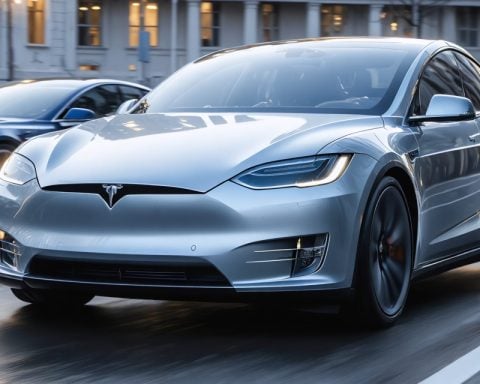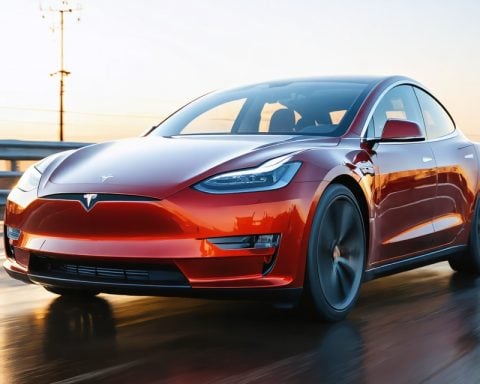- Elon Musk faces backlash due to his ties with President Donald Trump and involvement with the Department of Government Efficiency.
- The “Boycott Musk” movement has negatively impacted Tesla’s sales, notably with a 12% decline in California and drastic reductions in Europe—75.4% in Spain and 60% in Germany.
- Critics accuse Musk of undermining institutions by implementing radical layoffs and halting funding for research, education, and climate initiatives.
- The call for buyers to abandon Tesla vehicles serves as a protest against Musk’s decisions and ambitions.
- With dwindling sales and investor confidence, Tesla confronts increased competition from brands like BYD and Volkswagen.
- Growing shareholder dissatisfaction signals potential demands for changes in leadership at Tesla.
Elon Musk, the enigmatic figure at the helm of Tesla, finds himself in the eye of a storm as the company’s stock wavers beneath the weight of a growing boycott movement. The campaign, known as “Boycott Musk,” takes aim at Musk’s cozy ties with President Donald Trump and his role in the controversial Department of Government Efficiency (DOGE). Brave demonstrators rally across the nation, urging patrons to forego their beloved electric vehicles as a bold economic protest.
As January ushered in fresh registrations, California—the heartbeat of Tesla’s U.S. market—witnessed a disconcerting 12% decline. However, the European scene painted an even bleaker picture: Spanish sales plummeted by a staggering 75.4%, with Germany not far behind at 60%. France, Sweden, and the Netherlands echoed the descent, marking a challenging chapter for the automotive titan.
Thundering through the rhetoric of protest, critics chastise Musk for eroding critical institutions through radical layoffs and freezing funds meant for pivotal research, education, and climate ventures. In Ann Arbor, Michigan, the streets reverberated with demands to freeze Tesla’s coffers, as passionate voices marked buyer defection as a potent weapon against Musk’s unbridled ambitions.
Once buoyed by Musk’s visionary promise, Tesla’s stock sails now falter—an ominous sign reflecting nosediving sales and dwindling investor faith. Unfolding revelations from China to the liberal bastions of the U.S. reveal waning customer loyalty amidst Musk’s controversial politicking.
As the electric vehicle landscape electrifies with contenders from BYD to Volkswagen, Tesla wrestles with challenges magnified through the lens of one man’s divisive affiliations. The murmurs of shareholder dissatisfaction grow louder, hinting at potential calls for change at Tesla’s apex. The empire Musk built stands at a critical juncture, its future shimmering with uncertainty.
The Tesla Turmoil: Can Elon Musk Navigate Through the Storm?
Industry Overview & Market Trends
The electric vehicle (EV) industry is booming, with a projected global market size increase from $287 billion in 2021 to $1.31 trillion by 2028, growing at a CAGR of 24.3% according to Fortune Business Insights. However, Tesla, once a dominating force, is now facing severe competition from companies such as BYD, Volkswagen, and new entrants into the EV space. These competitors are leveraging advanced technology, aggressive pricing, and diversified product lines—a stark contrast to Tesla’s singular focus under Musk’s controversial leadership.
Real-World Use Cases
Despite the turmoil, Tesla vehicles continue to be well-regarded for their range, performance, and technological innovation. For instance, Teslas are often used as:
– Rideshare Vehicles: Thanks to their energy efficiency and lower maintenance costs.
– Tech-Savvy Consumers: Utilize Tesla’s self-driving capabilities and sophisticated software integration.
– Green Initiatives: Companies aiming to reduce carbon footprint include Tesla vehicles in their fleets.
Features, Specs & Pricing
Tesla’s product range includes:
– Model S: A luxury sedan starting around $88,000, featuring 405 miles of range.
– Model 3: A more budget-friendly option starting at $39,990, offering 267 miles of range.
– Model X: A premium SUV starting around $108,000, with a range of 348 miles.
– Model Y: A compact SUV priced from $52,990, popular for its 330-mile range.
Reviews & Comparisons
Tesla vehicles are frequently compared to:
– BYD Han EV: Known for its affordability and similar range.
– Volkswagen ID.4: Competes on price and brand reliability.
– Ford Mustang Mach-E: Rivaling Tesla’s performance metrics.
Controversies & Limitations
– Political Alignments: Musk’s connections with divisive political figures contribute to fluctuating brand perception.
– Labor Practices: Controversial layoffs and employment practices often draw criticism.
– Market Saturation: Increasing market saturation by other manufacturers affects Tesla’s market share.
Security & Sustainability
Tesla leads the industry with robust features, including advanced safety protocols and battery recycling programs. However, concerns over supply chain sustainability and workforce practices remain areas for improvement.
Pros & Cons Overview
Pros:
– Cutting-edge technology
– Strong community network (Superchargers and OTA updates)
– Long range and performance
Cons:
– High initial cost
– Concerns over leadership transparency and company stability
– Recent quality control issues
Actionable Recommendations
– Diversification: Tesla should expand its model lineup to cater to varied customer preferences.
– Public Relations: Address negative perceptions with transparency and community engagement.
– Sustainability Initiatives: Further enhance efforts in sustainable sourcing and disposal of battery materials.
For those looking to invest in or purchase a Tesla, consider timing your purchase around potential incentives and be informed about Tesla’s fluctuating stock prices.
Conclusion
While Tesla faces challenges, it remains a leader in EV innovation. As the market evolves, focusing on sustainable practices, customer diversity, and positive public relationships will be crucial for maintaining Tesla’s iconic status.
For more details on the electric vehicle industry and Tesla’s latest updates, visit Tesla.













